Ashka Jhaveri, Johanna Moore, Kathryn Tyson, Brian Carter, Annika Ganzeveld, and Nicholas Carl
The Iran Update provides insights into Iranian and Iranian-sponsored activities abroad that undermine regional stability and threaten US forces and interests. It also covers events and trends that affect the stability and decision-making of the Iranian regime. The Critical Threats Project (CTP) at the American Enterprise Institute and the Institute for the Study of War (ISW) provides these updates regularly based on regional events. For more on developments and in Iran and the region, see our interactive map of Iran and the Middle East.
CTP and ISW have refocused the update to cover the Israel-Hamas war. The new sections address developments in the Gaza Strip, the West Bank, Lebanon, and Syria, as well as noteworthy activity from Iran’s Axis of Resistance. We do not report in detail on war crimes because these activities are well-covered in Western media and do not directly affect the military operations we are assessing and forecasting. We utterly condemn violations of the laws of armed conflict and the Geneva Conventions and crimes against humanity even though we do not describe them in these reports.
Key Takeaways:
- Palestinian militias in the Gaza Strip conducted indirect fire attacks into Israel at their usual rate. Palestinian militias continued to launch attacks on the Erez military site from the northern Gaza Strip after the IDF advanced from there on October 29.
- Israeli forces advanced into Beit Hanoun in the northeastern Gaza Strip to conduct clearing operations. Israeli forces also extended their positions along the coastal line in the northwestern Gaza Strip.
- Local media and Palestinian militias claimed to engage Israeli forces moving westward south of Gaza City.
- Palestinian militants clashed with Israeli forces at their usual rate in the West Bank. Students held large, anti-Israel demonstrations across the West Bank.
- Iranian-backed militants, including Lebanese Hezbollah, conducted nine attacks into Israel as part of an ongoing attack campaign targeting IDF radar and sensor sites and military targets.
- Lebanese Hezbollah and Iran are creating the expectation in the information environment that Hezbollah will escalate against Israel on or around November 3, possibly by increasing the rate of attack or by using more advanced systems.
- The Houthis launched drones, ballistic missiles, and cruise missiles targeting Israel, marking the third attempted Houthi attack since the war began.
- An unidentified US military official reported that unidentified militants attacked US troops in four separate locations on October 30.
- Iranian Foreign Affairs Minister Hossein Amir Abdollahian traveled to Qatar for further political coordination with Hamas leadership.
Gaza Strip
Axis of Resistance campaign objectives:Erode the will of the Israeli political establishment and public to launch and sustain a major ground operation into the Gaza Strip
Degrade IDF material and morale around the Gaza Strip
Recorded reports of rocket attacks; CTP-ISW cannot independently verify impact.
Palestinian militias in the Gaza Strip conducted indirect fire attacks into Israel at their usual rate on October 31. The al Qassem Brigades—Hamas’ militant wing—claimed responsibility for 12 indirect fire attacks. The al Qassem Brigades military spokesperson said that the group will continue to strike Israel with rockets of all ranges.[1] Saraya al Quds—the militant wing of Palestinian Islamic Jihad (PIJ)—claimed responsibility for another nine indirect fire attacks. The Abu Ali Mustafa Brigades—the militant wing of Popular Front for the Liberation of Palestine—claimed to launch mortars into southern Israel.[2] The Israel Defense Forces (IDF) shot and killed a person attempting to cross from the Gaza Strip into Israel at the Reim junction, which is the first ground infiltration attempt that CTP-ISW has recorded since October 21.[3]
Palestinian militias continued to launch attacks on the Erez military site from the northern Gaza Strip after the IDF advanced from there on October 29. The al Qassem Brigades detonated an IED and fired anti-tank munitions at IDF tanks east of Erez.[4] CTP-ISW cannot verify whether the attacks occurred in the Gaza Strip or Israel. The Saraya al Quds Brigades fired mortars at the Erez site.[5]
Hamas and PIJ leaders boasted about Palestinian militia resistance in the Gaza Strip. A Hamas senior leader Daoud Shihab said the resistance is on the verge of achieving a major strategic victory in the Gaza Strip.[6] Saraya al Quds military spokesperson Abu Hamza stated that the group’s jihad will continue no matter how long the war lasts.[7]
Recorded reports of rocket attacks; CTP-ISW cannot independently verify impact.
Israeli Ground Operations in the Gaza Strip
Israeli forces advanced into Beit Hanoun in the northeastern Gaza Strip to conduct clearing operations. Israeli infantry and tanks maneuvered through Beit Hanoun on October 31.[8] Local media reported that Palestinian militias engaged the IDF north of Beit Hanoun.[9] The New York Times noted that lines of armored vehicles traveled on the Salah al Din road running north to south in the Gaza Strip and in the northeastern corner of Beit Hanoun.[10] The al Qassem Brigades attacked an IDF unit clearing a building in the area.[11] The IDF said its forces engaged in fierce battles deep inside the Gaza Strip and eliminated military infrastructure and seized weapons, including IEDs.[12] The al Qassem Brigades military spokesman said that militants have introduced various types of lethal explosive devices to the battle.[13]
Israeli forces extended their positions along the coastal line in the northwestern Gaza Strip. The New York Times satellite imagery showed dozens of armored vehicles cutting through open fields and amassing in urban spaces.[14] Israeli vehicles are seen as far south as the neighborhood of al Karama, according to the New York Times.[15] The Hamas-run Gazan Interior Ministry claimed that the IDF advanced to al Karama from the northwestern Gaza Strip.[16] The Saraya al Quds Brigades launched mortars at IDF vehicles west of al Karam.[17]
Local media and Palestinian militias claimed to engage Israeli forces moving westward south of Gaza City. The al Qassem Brigades, Saraya al Quds Brigades, and al Aqsa Martyrs’ Brigade attacked IDF forces in the central Gaza Strip.[18] Al Qassem Brigades militants claimed to destroy four vehicles with anti-tank munitions at the Netzarim junction, although CTP-ISW has seen no evidence that these claims are true.[19] A Palestinian journalist claimed that the IDF is operating inside outposts near the al Nour resort and near the Tika hospital after advancing westward from Samouni neighborhood.[20] The Hamas-run Interior Ministry claimed that Israeli vehicles on the Sala al Din road are trying to reach the al Rashid Street less than three kilometers away on the coast.[21] The locations of clashes are consistent with the Israeli-declared evacuation zone north of the HeBesor stream.[22]
West Bank
Axis of Resistance campaign objectives:Draw IDF assets and resources toward the West Bank and fix them there
Palestinian militants clashed with Israeli forces at their usual rate in the West Bank on October 31. CTP-ISW recorded ten small arms clashes between Palestinian militants and Israeli forces.[23] Palestinian militants also conducted three IED attacks on Israeli forces.[24] The al Quds Brigades and the Tulkarm Battalion of the al Aqsa Martyrs’ Brigades conducted a combined small arms attack on Israeli forces in Shuweika near Tulkarm, indicating growing coordination between the two groups.[25] This was the first combined attack between the al Quds Brigades and al Aqsa Martyrs’ Brigades in the West Bank since October 19.[26]
Students held large, anti-Israel demonstrations across the West Bank on October 31. Students held 14 anti-Israel demonstrations in major cities in the West Bank, including Bethlehem, Jenin, and Tulkarm.[27] These are consistent with the rate of demonstrations that CTP-ISW has observed in the last few weeks.
Senior Hamas leader Daoud Shehab said on October 30 that the al Quds Brigades is “leading the way” in the West Bank.[28] This remark is noteworthy in that it reflects a prominent Hamas official framing PIJ as one of the lead Palestinian militias fighting Israel in the West Bank. The al Quds Brigades has regularly claimed attacks targeting Israeli forces in the West Bank since October 7.[29] CTP-ISW has consistently reported on the close coordination between Hamas and PIJ throughout the war.
This map is not an exhaustive depiction of clashes and demonstrations in the West Bank.
Southern Lebanon and Golan Heights
Axis of Resistance campaign objectives:Draw IDF assets and resources toward northern Israel and fix them there
Set conditions for successive campaigns into northern Israel
Iranian-backed militants, including Lebanese Hezbollah (LH), conducted nine attacks into Israel as part of an ongoing attack campaign targeting IDF radar and sensor sites and military targets. LH claimed four mortar and anti-tank missile attacks on IDF positions in northern Israel on October 31.[30] Unknown militants conducted four anti-tank, rocket, mortar, and small arms attacks into northern Israel as well.[31] Unknown militants also fired two rockets, which the IDF reported did not cross into Israeli territory.[32] The IDF continues to conduct airstrikes and artillery on militants, who are attempting to launch indirect fire from southern Lebanon into northern Israel.[33]
Iran and Axis of Resistance
Axis of Resistance campaign objectives:Demonstrate the capability and willingness of Iran and the Axis of Resistance to escalate against the United States and Israel on multiple fronts
Set conditions to fight a regional war on multiple fronts
LH and Iran are creating the expectation in the information environment that LH will escalate against Israel on or around November 3, possibly by increasing the rate of attack or by using more advanced systems. LH has released two dramatic videos in recent days ahead of LH Secretary General Hassan Nasrallah’s planned speech on November 3, which creates the expectation of a significant announcement on the Israel-Hamas War.[34] This speech is significant in that it will be Nasrallah’s first public statement on the war. Iranian state media has further amplified the news of the upcoming speech and the dramatic videos, describing them as a “sign of future events.” Iranian state media also compared Nasrallah’s upcoming speech to the one he delivered at the beginning of the 2006 Israel-LH war.[35] Nasrallah’s speech and the two LH videos come as LH is coordinating extensively with Hamas, PIJ, and the IRGC Quds Force in Beirut.[36] The speech and videos also come as the Houthi movement threatened that it will ”continue its strikes with rockets and drones until the Israeli aggression stops” during its statement claiming responsibility for three attacks against Israel since October 18.[37] Iranian state media has framed the Houthis’ statement as a declaration of war against Israel.[38]
It is possible that Nasrallah will make an escalatory statement on November 3, promising retaliation against Israel but refrain from taking any immediate action different from what LH has been already doing along the Israel-Lebanon border. LH and Nasrallah have used a similar pattern of rhetoric previously. For example, Nasrallah said in April 2023 that Israeli actions in early that year “may push the region into a major war.”[39] LH did not conduct any major escalatory moves in the weeks following this statement. An unspecified source “familiar with [LH] thinking” claimed to Reuters on October 26 that LH does not want Lebanon’s destruction or to see Lebanese civilians fleeing from southern Lebanon, where LH maintains prominent influence.[40]
The Houthis launched drones, ballistic missiles, and cruise missiles targeting Israel on October 31.[41] Israel intercepted the drones and missiles using its Arrow anti-ballistic missile system and fighter jets.[42] Users on social media posted an image showing a destroyed Quds-4 cruise missile in Jordan on October 31.[43] The Houthi movement possesses drones, ballistic, and cruise missiles capable of hitting Israel.[44] This marks the third attempted Houthi attack on Israel since the war began.
An unidentified US military official reported that unidentified militants attacked US troops in four separate locations on October 30. CTP-ISW previously reported that the Islamic Resistance in Iraq—a coalition of Iranian-backed Iraqi militias—claimed two separate rocket attacks targeting US forces stationed at Ain al Asad airbase and Conoco Mission Support Site on October 30.[45] The following text details the attacks that CTP-ISW has not yet reported.
- Local Syrian and Iraqi social media accounts reported that unidentified militants conducted a rocket attack on US forces stationed at al Omar oil field on October 30.[46] The militants launched between five and 15 rockets at the US position. CTP-ISW has recorded at least five attacks targeting US forces stationed at al Omar oil field since October 18, one of which was claimed by the Islamic Resistance in Iraq. Eye of Euphrates claimed that Iranian sleeper cells active in Syrian Democratic Forces (SDF)-held territory have similarly attacked US forces stationed at al Omar oil field in recent days, as CTP-ISW previously reported.[47]
- The Islamic Resistance in Iraq claimed a second attack targeting US forces stationed at Ain al Asad airbase on October 30.[48] The group’s statement claimed its forces conducted a drone strike on Ain al Asad airbase and successfully hit their target. Local Iraqi outlet Shafaq reported that the Islamic Resistance in Iraq launched two drones in the attack and that both were downed by the defensive systems at the airbase.[49]
The secretary general of the Iranian-backed Iraqi Badr Organization, Hadi al Ameri, argued that International Coalition forces should leave Iraq in a statement given to local media on October 30.[50] Ameri claimed that there was no longer any justification for International Coalition forces to remain in Iraq to support counter-ISIS operations because Iraqi security forces defeated ISIS at its height in 2015. The United States currently has non-combat troops stationed in Iraq operating in an advisory capacity to support counter-ISIS missions under Operation Inherent Resolve (OIR).[51] Ameri also asserted that International Coalition forces present in Iraq are limiting the growth of Iraqi security institutions.
Ameri argued that Iranian-backed Iraqi militia attacks on US forces were a “natural reaction” to US support for Israel. The Badr Organization threatened to attack US forces in the region if the United States intervened in the Israel-Hamas war on October 9.[52] US Secretary of Defense Lloyd Austin reported that the United States will “take further necessary measures” to protect US forces stationed in the Middle East if Iranian-backed attacks continue.[53]
Iranian Foreign Affairs Minister Hossein Amir Abdollahian traveled to Qatar for further political coordination with Hamas leadership. Abdollahian met with Hamas Political Bureau Chairman Ismail Haniyeh in Doha on October 31, marking the second time these officials have met there since October 15.[54] Abdollahian warned about the possible expansion of the Israel-Hamas war, stating that members of the Axis of Resistance “do not necessarily wait for political decisions” to act against Israel. Abdollahian also criticized US calls for restraint, claiming that the United States is “practically a party in the war.” These statements are consistent with the ongoing Iranian information operation to frame the United States and Israel as responsible for any further escalation of the war.[55]
Abdollahian also met with other unspecified senior Hamas officials, Qatari Emir Tamim bin Hamad al Thani, and Qatari Prime Minister Mohammed bin Abdul Rahman bin Jassim al Thani during his visit to Qatar.[56] Abdollahian last traveled to Qatar on October 14 following his diplomatic tour to Iraq, Lebanon, and Syria to coordinate with senior leaders in the Axis of Resistance, as CTP-ISW previously reported.[57] Abdollahian will travel to Turkey after concluding his current visit to Qatar.[58]
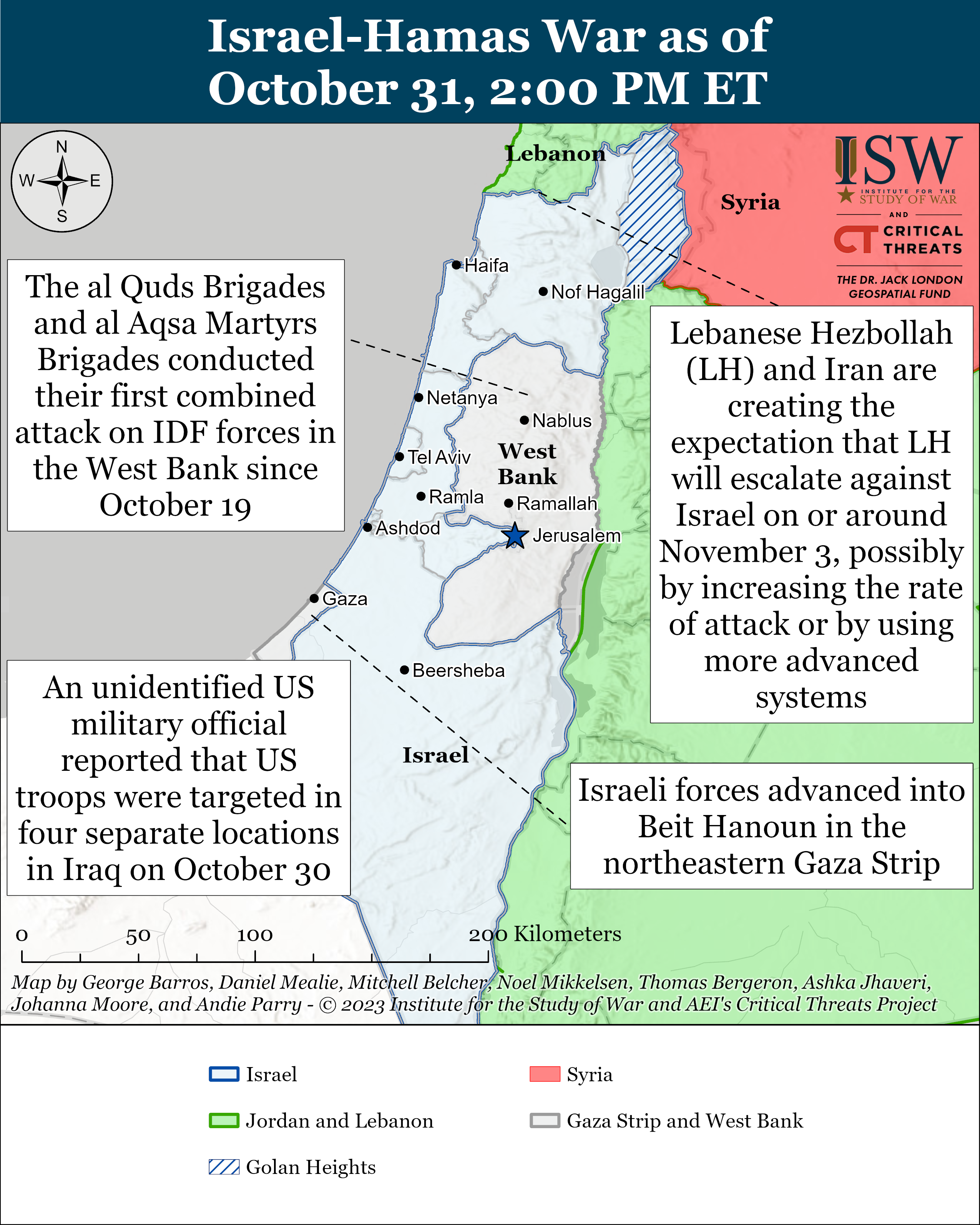
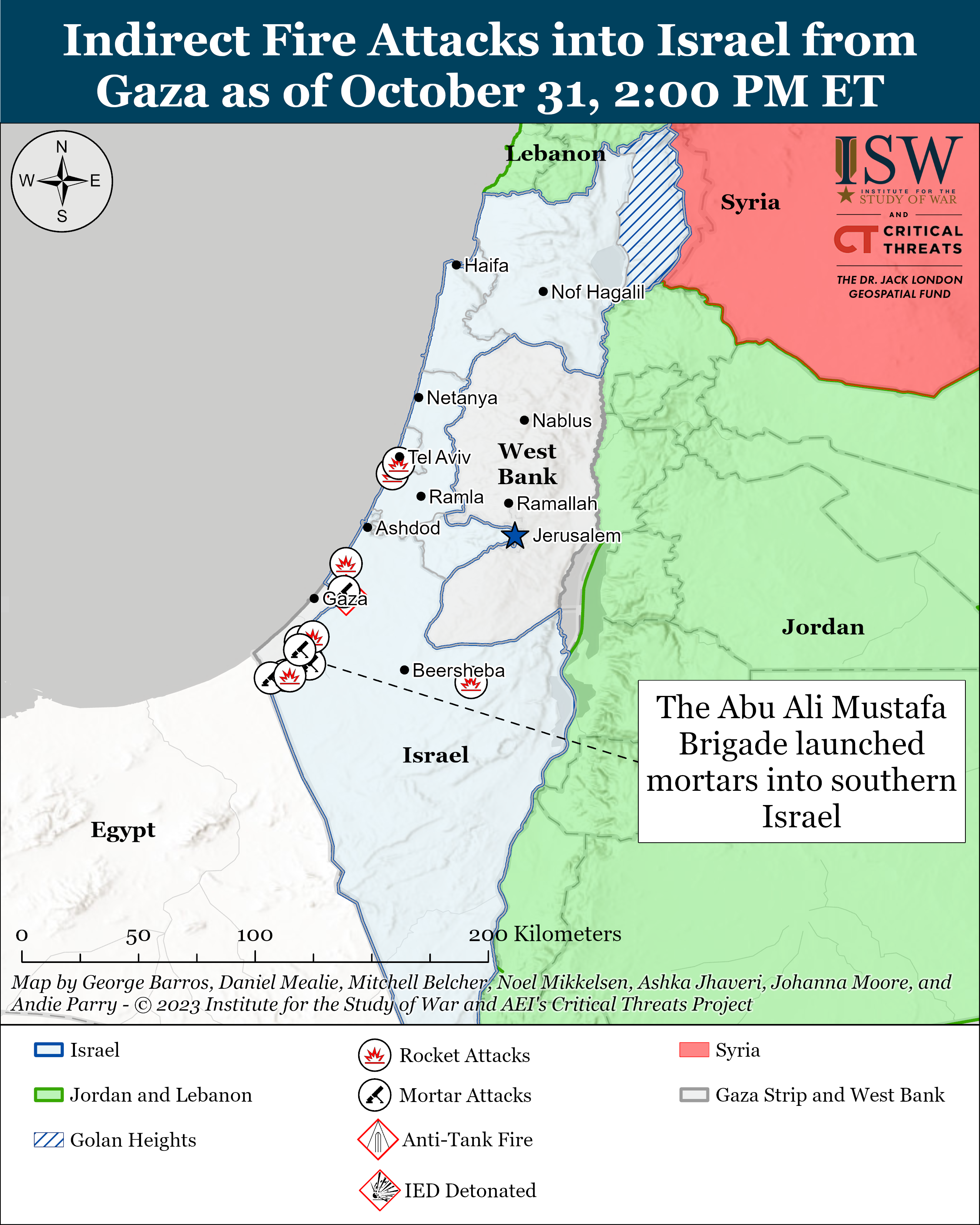
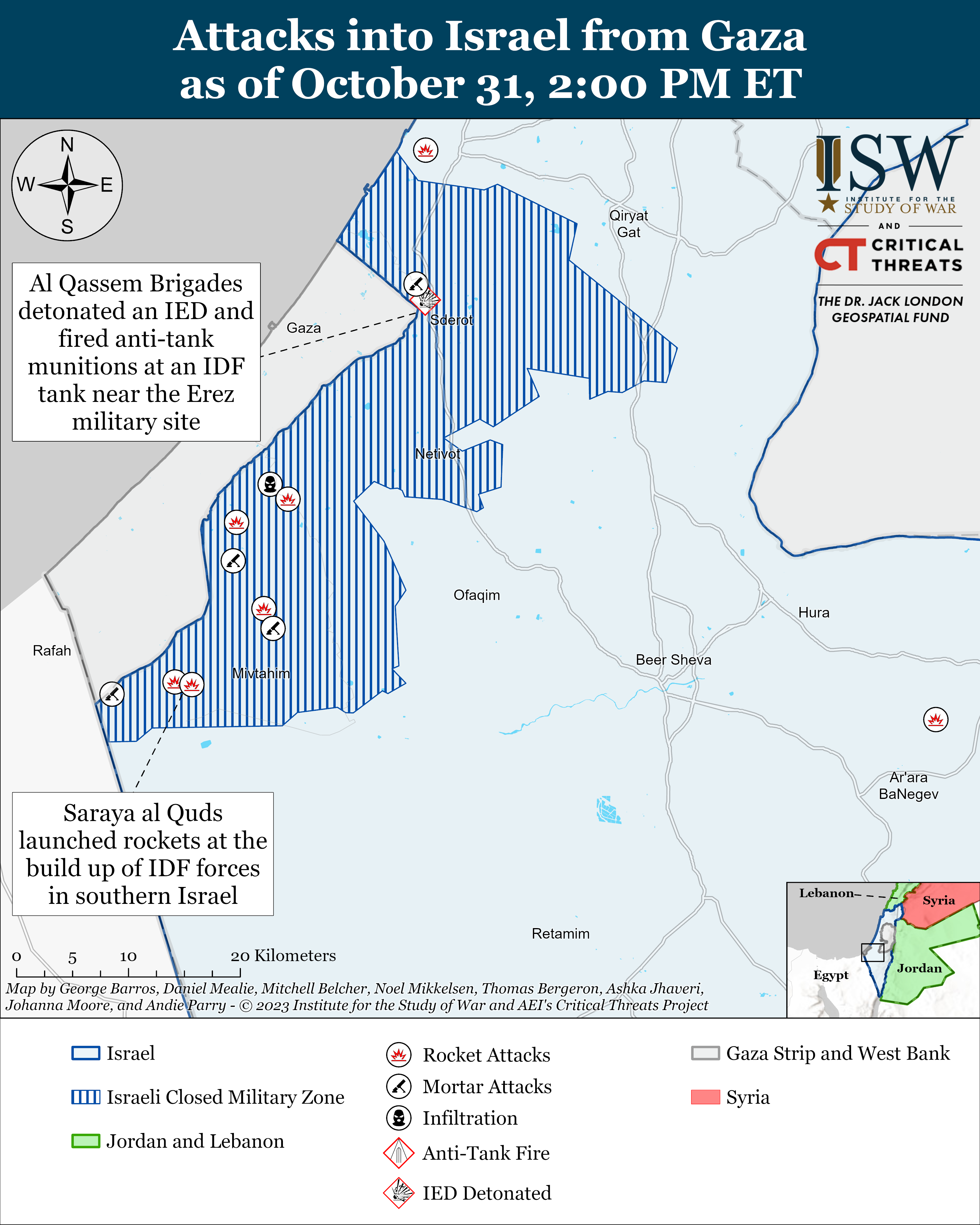
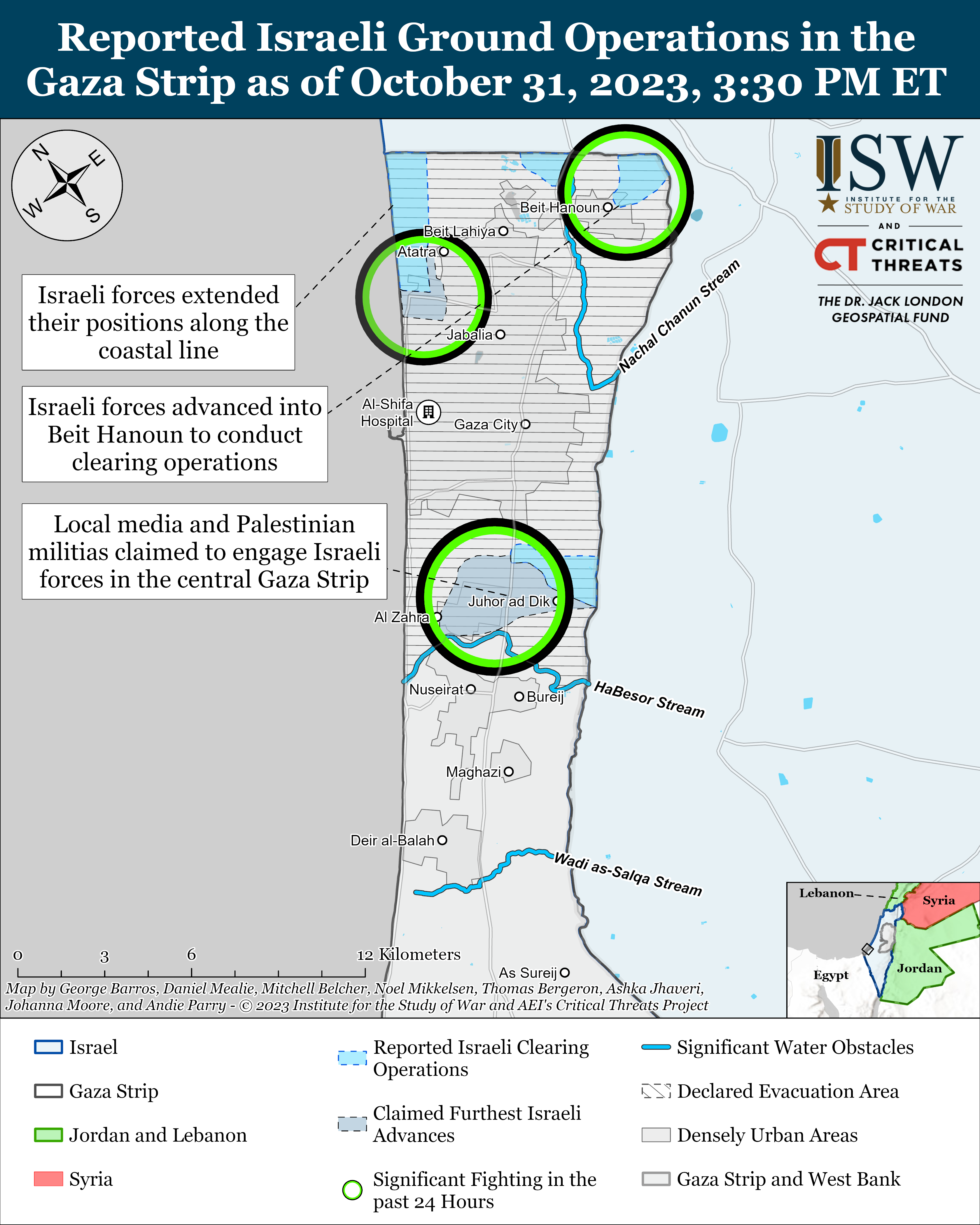
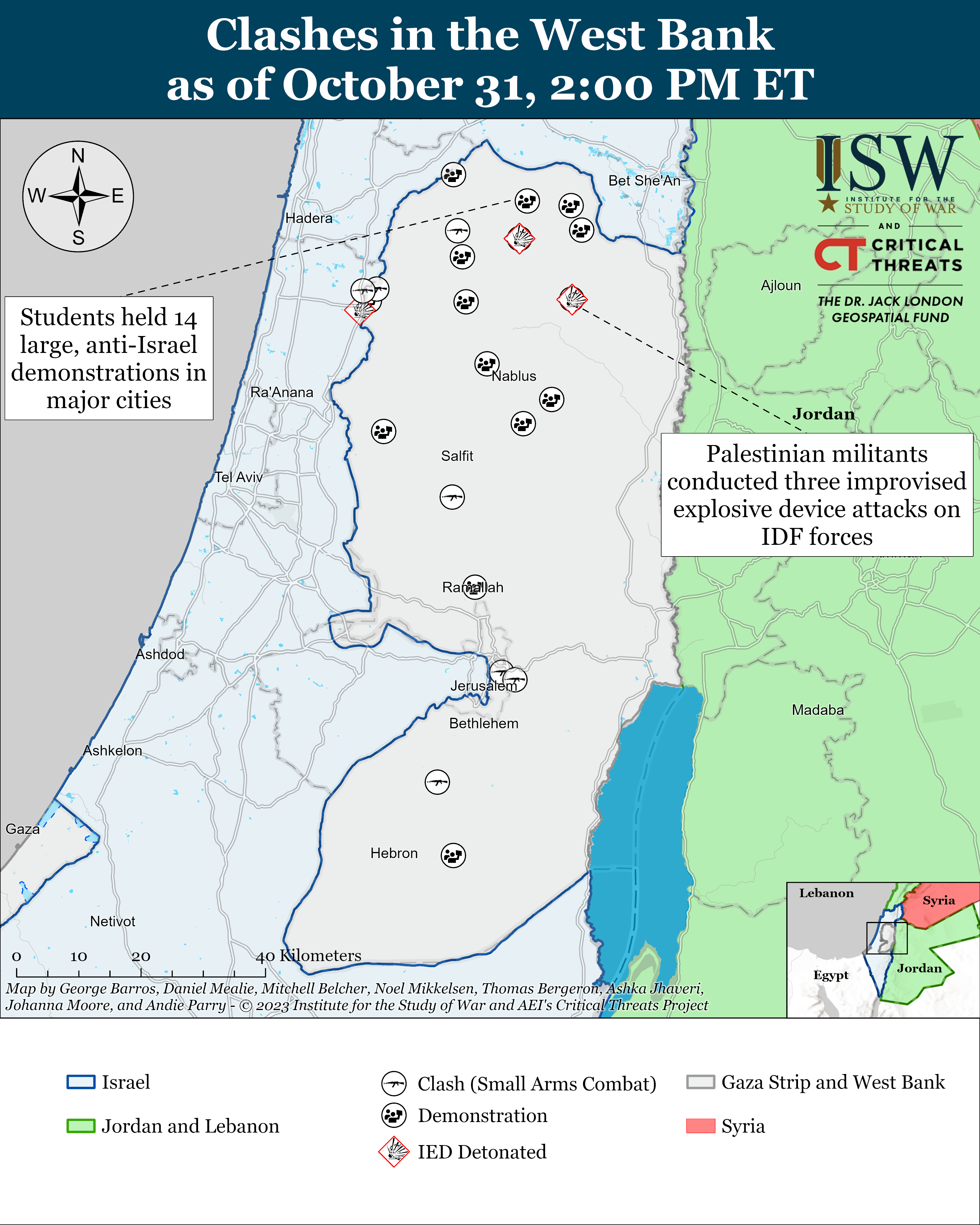
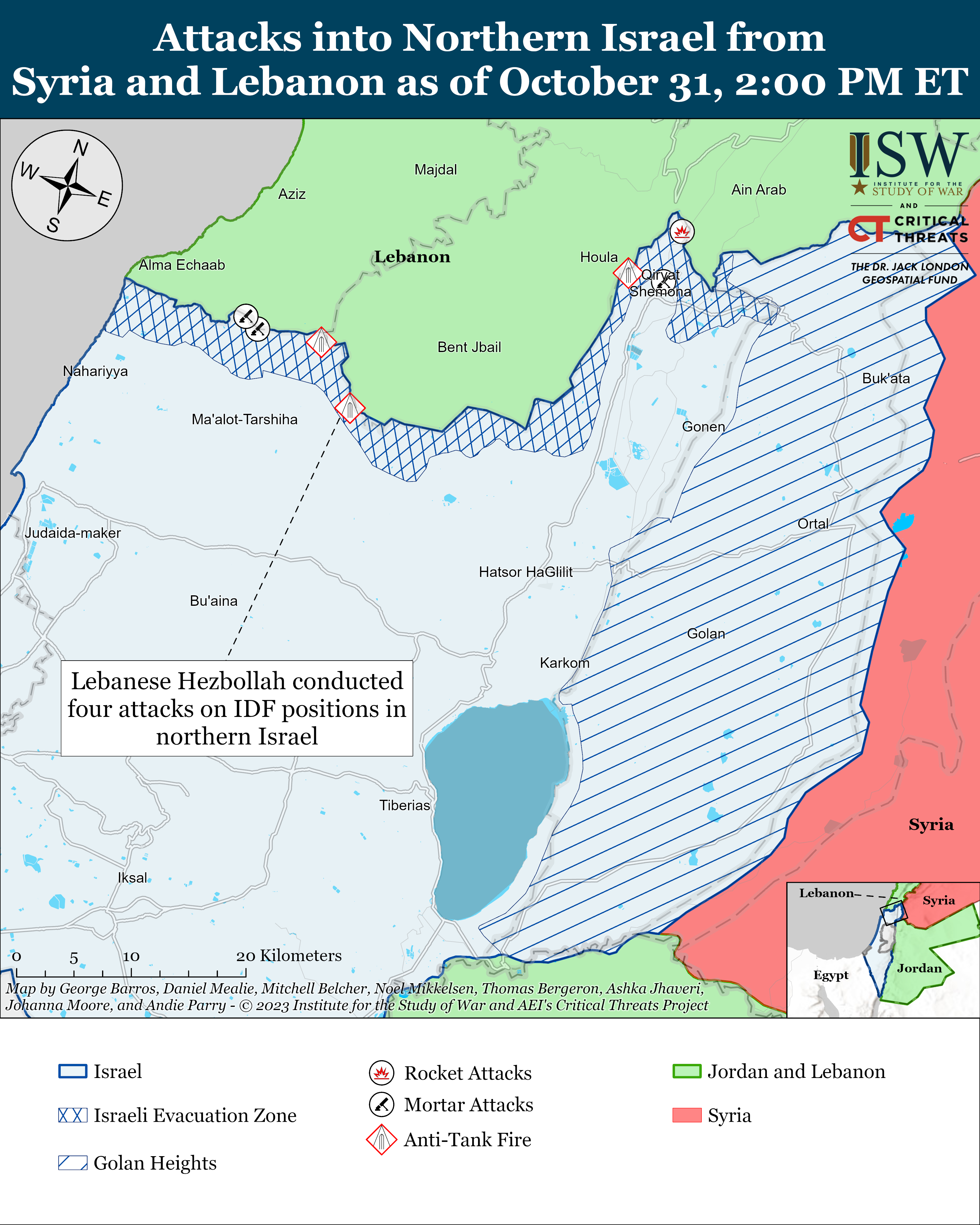
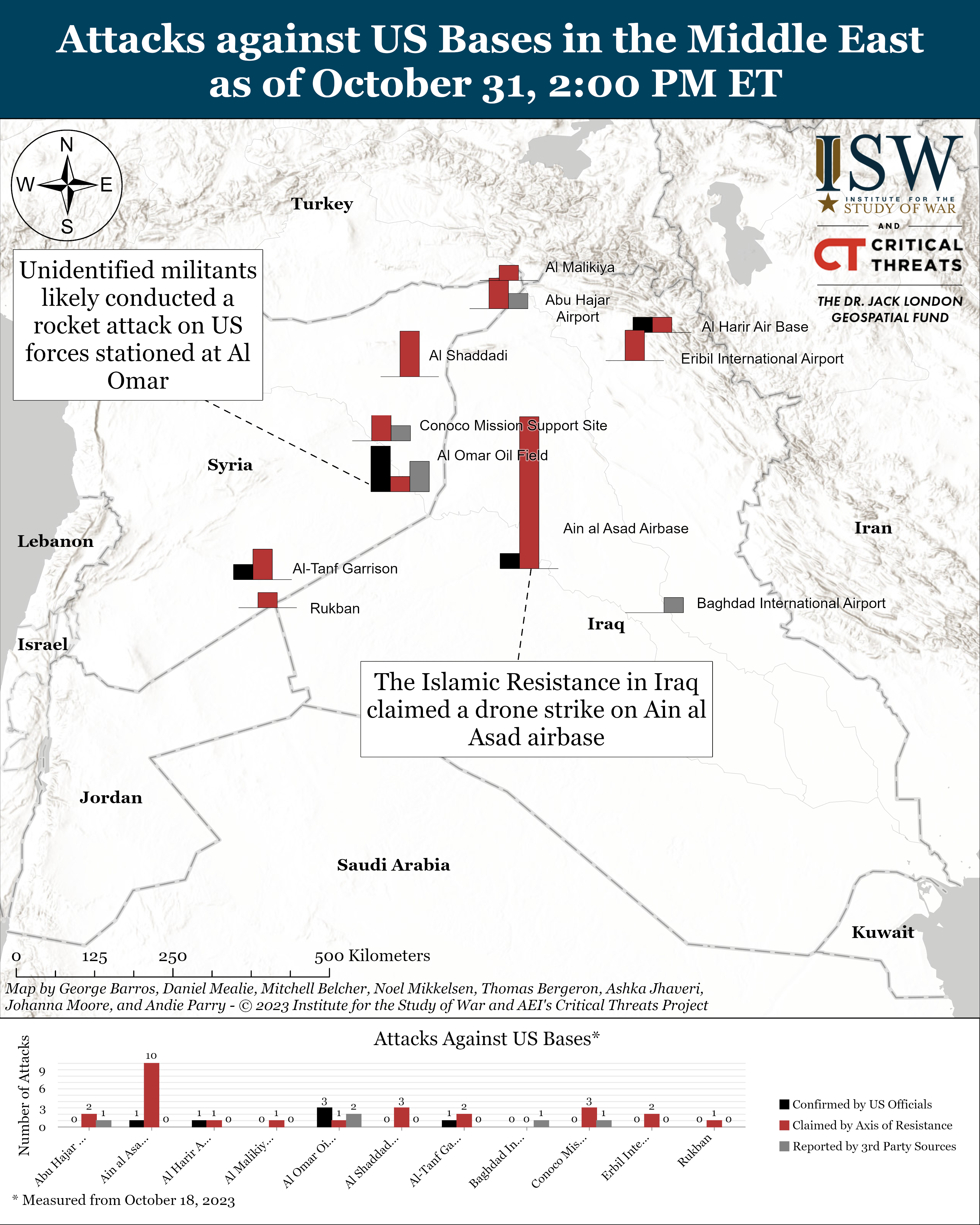
No comments:
Post a Comment